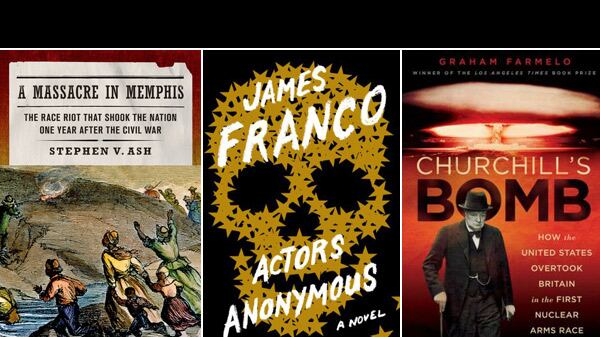Actors Anonymous by James Franco.

Though James Franco can now add “novelist” to his already lengthy curriculum vitae, his new book Actors Anonymous is less a novel than a collection of tangentially related short works, both fictional and non-fictional. He may not yet be a good enough writer to sustain a full scale novel, but Franco can write compelling short fiction. Of particular note are “McDonalds I” and “McDonalds II,” a pair of short stories about a struggling actor who works at a drive-thru, as Franco himself did before being discovered. Though frequently criticized as self-indulgent, the actor—as he sometimes refers to himself in Actors Anonymous—is at his best when he writes about his favorite subject: James Franco. “Back to Bataan” is an entertaining and insightful behind-the-scenes essay about the grueling boot camp preparation for the immediately forgotten 2003 war film The Great Raid, and “The Sass Account” is a genuinely funny series of profane, confrontational annotations to an unfavorable magazine profile—Marc Edouard Leon’s feature on Franco for Flaunt magazine, here thinly disguised. Less successful are “Windsor Girl,” a short story told from the perspective of one of Franco’s co-ed conquests, and his more experimental pieces, including the several chapters of banal aphorisms about acting and a series of poems about River Phoenix. However, the structure of the book is such that these episodes pass by painlessly, quickly getting out of the way of Franco’s better, more straightforward work. It is to Franco’s credit that in Actor’s Anonymous the good far exceeds the bad.
—Thomas Flynn
This House is Haunted by John Boyne.

John Boyne’s last novel, 2011’s The Absolutist, was a tragic-realist story of forbidden love in the trenches of WWI. In his latest work, This House is Haunted, he tries his hand at a Dickensian ghost story (as if it weren’t obvious from the more than slightly on-the-nose title.) Dickens himself makes a cameo in the book’s first pages: Eliza Caine, the young Englishwoman who serves as the novel’s narrator, escorts her sickly father to one of Dickens’ famously theatrical readings in London, 1867, after which they return home and the father promptly dies from the chill. Eliza, now adrift, takes a job as a governess (in fine Dickensian tradition), but the house and children over which she governs quickly prove to be, well, haunted, in such a way that any modern cultural consumer could have warned her about; the house exhibits many textbook paranormal warning signs, stopping just short of the door slamming behind her, Scooby-Doo style. Boyne’s plotting and pacing are first-rate, and his mastery of the slow-boil is evident here as Eliza gets to the bottom of things. He’s also done a fine job of appropriating a stilted Victorian idiom. It’s worth wondering, however, if this is a desirable trait, for a writer writing in 2013. Is ‘idiom’ enough to defend to the modern reader sentences like this? “I was not in my right senses, so struck was I by the grief which had fallen upon my mind.” Probably not.
—Nicholas Mancusi
The Two Hotel Francforts by David Leavitt.

Novels dealing with expatriates are often interesting because, in addition to the regular challenges that the characters face with regards to being away from home, their nationally inborn ideologies are cast in relief against those of their host nation, and stand out more starkly. Pen/Faulkner Award finalist David Leavitt’s new novel, The Two Hotel Francforts, has all of these features, with the addition of strong sexual drama. The book is built around two couples in the Portuguese city of Lisbon in 1940. Lisbon is one of the last neutral ports in Europe, and the city is crowded with people looking to escape the gathering storm. While waiting for passage to safety in New York, Americans Pete and Julia Winters meet the English Edward and Iris Freleng, and we learn of the strains being applied to the marriages, which are both stable but generally loveless. Soon, the men find themselves conducting an affair not with each other’s wives but with each other. Their liaisons would be dangerous even if they weren’t set against the backdrop of war, the threat of discovery combined with the threat of death. The book is as atmospherically evocative as Joseph Kanon’s Istanbul Passage (set in another neutral port city during the war) but it’s the affecting love story, unique in structure and told in Leavitt’s intelligent prose, that makes it worth recommending.
—NM
A Massacre in Memphis by Stephen V. Ash.

In May of 1866, a race riot occurred in Memphis that few today have heard of, although many would be surprised that they haven’t. With A Massacre in Memphis, Stephen V. Ash has issued the first book-length treatment of the incident, in which a three-day maelstrom of violence killed 46 former slaves who were recently freed in the Civil War that had ended hardly a year before. Ash writes with the circumspection properly due to a historian, but he also has a moral streak: this book is not only a needed addition to academia, but also an act of social remembering that he calls “a historical and moral imperative.” Towards this end of bringing the incident to life in the consciousness, and the conscience, of the reader, he makes the bold choice of narrating the riot in present tense. “At a point just south of South Street … A crowd of fifty or more has surrounded a uniformed black man. He has tried to escape, but now, seeing that that is impossible, he turns and moves towards his pursuers with his arms outstretched in surrender and supplication. A white citizen steps up and slams him in the head with the butt of a pistol.” The gambit pays off. The tense doesn’t only enliven the narrative flow, but also drives home the reality of an ugly incident that we should not soon, or ever, forget.
—NM
Churchill’s Bomb by Graham Farmelo.

At no other time in history was the vaunted “special relationship” between England and the U.S. more evident than during WWII. But there was one arena into which their cooperation did not extend: the race to develop a nuclear weapon. In Churchill’s Bomb, Graham Farmelo (winner of the Los Angeles Times Book Prize for The Strangest Man) shows how the British, who were on pace to develop a bomb first, planted the seeds of what would become the Manhattan Project, and then quickly fell off course, and how and why the Americans chose to go on without them. This is a complex and engrossing history with obvious geopolitical import, but what’s most interesting is the human drama involving Churchill, FDR, and the constellation of scientific egos circling around them. Farmelo also wonderfully draws out Churchill’s surprising futurism, bound up with a strain of fatalism; we see his preoccupation with the fact that mankind’s destructive development hugely outstrips his moral development, and how, especially for someone who had witnessed the unrestrained horrors of WWI, nuclear power could represent such an effective method to bring about the end of the world. As he said: “You may teach a dog all kinds of tricks … but you can’t improve the breed of a dog in hurry.” However, compare this philosophy with the fact that, for a time, Churchill favored preemptive nuclear war against Russia. Contradictions like these are part of the reason that the scholarship of Churchill is still so lively today, and this book will make a welcome addition to the canon.
—NM







